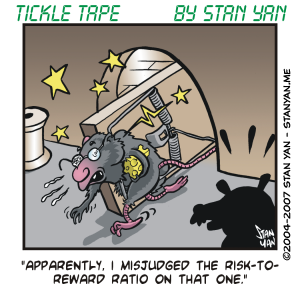Many people think the best way to cope with unacceptable ideas is to pretend that they are irrelevant and just don’t matter. It seems easier to deny the unpleasant or unacceptable than acknowledge it. But ironically, denial uses up precious psychological resources. Trading is difficult and it’s essential that you mobilize every bit of limited psychological energy you have, and focus it all on trading. Consciously or unconsciously denying thoughts and ideas about trading that are hard to accept interferes with your ability to maintain concentration and freely look at the market from a carefree and objective perspective.
One of the best ways to free up psychological energy is to simply acknowledge all possible ideas you have trouble accepting. For some people, that’s all it takes: Acknowledge the unpleasant idea, realize it may be true, accept it, and move on. For others, it is a little more difficult. They must write down the idea, write down instances where the idea may prove true, and the reasons to move on despite the veracity of the idea. But wherever you stand on your ability to acknowledge the unacceptable and move on, the process can start only after you review the ideas you find the most unacceptable. Let’s study a few possible examples.
A novice trader may believe, “Maybe I’m not a very skilled trader. Perhaps, I’ve just had a run of good luck.” For novice traders, early success may actually reflect a run of good luck. In all likelihood, a novice trader runs “hot” for a while, but eventually, a lack of skills catches up with him or her. If you feel that this statement is true for you, even just a little bit, it is worth acknowledging it. Why not admit your limitations? By pretending that you can trade with skills you really don’t have, you will waste your limited psychological energy denying your limitations. It’s a very passive approach to coping with the stresses and strains of trading.
You’ll tend to spend more psychological energy trying to deny an undesirable possibility, rather than using your limited energy efficiently. And if you trade without the requisite skills, you may also lose quite a bit of money. It would be better to use your time wisely by actually gaining more trading experience, and honing your trading skills so that you can trade consistently. A related idea is, “I can prepare for hours but I may still fail.” This is a hard fact to deal with. Many would-be traders put intense effort into learning to trade, yet they still fail. It’s a hard idea to accept, since the next logical thought is, “If trading is so hard, then why am I doing this?” It is vital to acknowledge this idea and deal with it in your own way.
“Perhaps I was a good trader at one time, but the market conditions have changed and I may not be able to keep my reputation up.” This is an issue that all traders face at some point: keeping up their reputation. When one makes big profits trading, it’s tempting to tell neighbors and friends how well you are doing. It’s great when you’re making the big profits, but keeping up appearances is often the downfall of even the most astute trader. Again, denying your need for fame and glory, or pretending that you can maintain an unrealistic reputation, will use up your psychological energy and interfere with your ability to concentrate. Huge profits tend to go to the humble, so try not to build up your reputation. Admit that you will have difficulty keeping up appearances and just quit doing it.
One fact that traders wrestle with continuously is the notion that, “Trading is not a legitimate job.” Many traders struggle with the legitimacy of trading. Some traders find that they can simply remind themselves, “Trading provides liquidity and helps control prices.” Other traders, however, think this isn’t good enough and need to find more meaning in their daily trading activities. For example, they may focus on how trading helps them provide for their family, or may plan to donate some of their profits to charities they view as personally valuable. The point is, don’t deny the possible truth to such ideas. You will be better off acknowledging and working through them and then just moving on. Denying they exist, on the other hand, will use up time and energy.
Unacceptable beliefs tend to lie in the back of your mind. They remain there, lurking, and when you are vulnerable, they can powerfully influence your outlook. So acknowledge unacceptable ideas, and once you admit the possible validity of such ideas, you will neutralize their potential influence. This will free up limited psychological resources, allowing you to focus all your energy on trading profitably and consistently.

